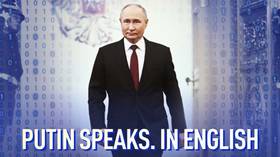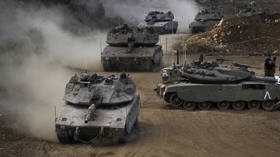The West isn’t buying Zelensky’s ‘Victory Plan’. So what happens next?
The Ukrainian leader has tough choices to make, and if he gets them wrong the situation may spiral out of control
By Vitaly Ryumshin, Gazeta.Ru political analyst
From Ukraine’s perspective, the military confrontation with Russia appears to have finally reached a stalemate. Vladimir Zelensky’s latest diplomatic tour, aimed at shaking up support for Kiev in the West, has brought no breakthroughs. And the future of the conflict is now very much up in the air.
The hopes of the Ukrainian leadership have revolved around a so-called ‘victory plan’. The title of the document should speak for itself – it’s apparently Kiev’s strategy for defeating Russia, and it consists of four or five not entirely comprehensible points. In any case, Zelensky went to the United States last week to present it.
During the negotiations, however, it became clear that Ukraine and the West had very different ideas of what the strategy should be. The Americans and Western Europeans expected Kiev to present them with a clear vision of victory and a roadmap for achieving it. Instead, the Ukrainians brought a list of “demands” that the US and EU should fulfil so that Kiev can eventually negotiate from a stronger position.
Zelensky insisted that the implementation of all these points, combined with the Kursk operation together with permission to attack Russia with long-range weapons, would help tip the scales in Ukraine’s favor.
However, according to Western insiders, what the decision-makers saw didn’t impress them. They considered some of the points to be a repetition of previous demands, adding nothing new to the current dynamics of the conflict. And some of the proposals were considered dangerous by the West. This applies in particular to the type of strikes into Russia touted by Kiev.
As a result, the ‘victory plan’ received a resounding ‘no’, and Zelensky left the US with no hope of ending the conflict on his own terms. Western media are already writing that he has been left alone with Russia and his internal problems. But is this true, and does Ukraine have possible alternatives?
According to Zelensky, Kiev does indeed have its own ‘Plan B’ – to continue fighting as before, with limited Western aid and instead relying more on domestic resources. In this case, of course, Ukraine will have to go into a defensive posture and try to hold out. The question is, for how long and to what end?
They can try to wait for a change in the political climate in the West. For example, after the November elections, Kamala Harris could come to power in Washington, and her administration may well take a more decisive stance on the Ukrainian conflict. The Western Europeans will, of course, have to follow America’s lead.
A ‘black swan’ event could also occur, causing Russia to collapse on its own. Such a development is unlikely and difficult to predict, but Ukraine has been waiting for this since at least December of last year.
In other words, the most realistic goal of ‘Plan B’ is to survive until the beginning of next year and then decide what to do next. Kiev should have enough resources for that. Zelensky has consolidated his power by cracking down on the parliamentary opposition, removing opponents from the power vertical and denying the West any leverage over him. The Ukrainian armed forces are in a chronic crisis, but the front is not collapsing. Disillusionment with the government’s policies is growing in Ukrainian society, but the majority are still unwilling to compromise with Russia.
For Zelensky, the most important thing is to assess the situation correctly and not mistime his moves. If the political situation doesn’t improve and no ‘black swans’ occur, the Ukrainian authorities will have to find answers to difficult questions.
How will they deal with the downbeat mood in Ukrainian society? How can the army achieve new victories when the core of motivated veterans is running low and is being replaced by demoralized and poorly trained draftees? What can be done about the Kursk operation, which is becoming more trouble than it’s worth? How to compensate for the apparent lack of supplies from abroad? How to motivate the West to stay in the game for ‘as long as it takes’?
This is not an exhaustive list of the problems Zelensky will have to solve. And it is far from certain that the result of his travails will not be a ‘shameful’ peace with Russia, which is now so categorically rejected in Kiev. On the contrary, it is highly likely that if Kiev delays a decision on negotiations, its peace agreement will become even more ‘shameful’.
And that brings us to the third option. What if they don’t wait for better terms and start negotiations now? The West will certainly support such a decision – its leaders are increasingly coming around to the idea that it is time to close up shop, and have even conjured up a formula of “territory in exchange for NATO.”
But Russia may not like it. The Kremlin’s main goal in Ukraine is not territorial gains but the beginning of a strategic dialogue with the West, which would lead to an end to NATO’s eastward expansion. The West and Kiev either do not yet want to accept this, or genuinely don’t understand the Kremlin’s motives. But if they are serious about dialogue, Moscow’s interests will have to be taken into account. Otherwise, any peace initiative will be doomed to failure.
This article was first published by the online newspaper Gazeta.Ru and was translated and edited by the RT team







Comments are closed.